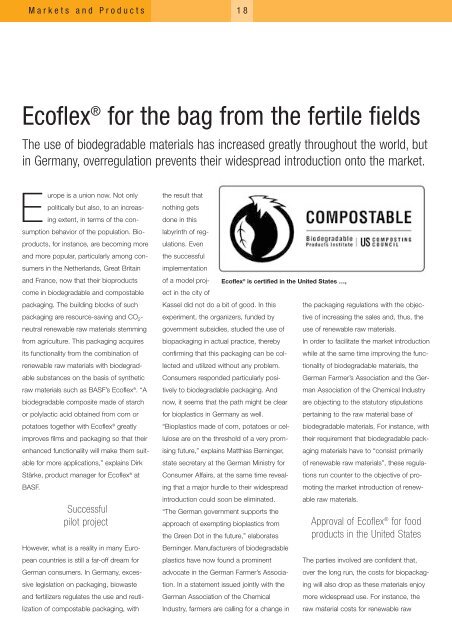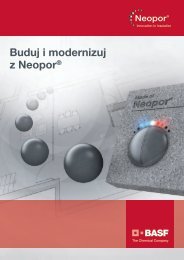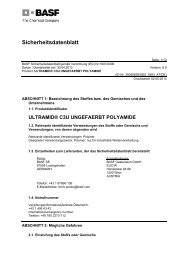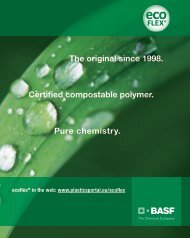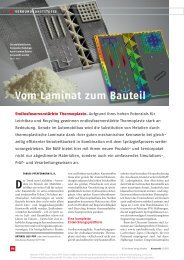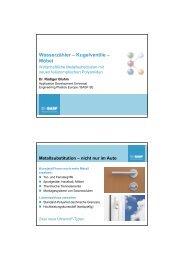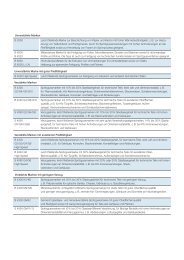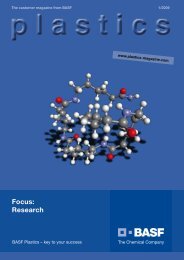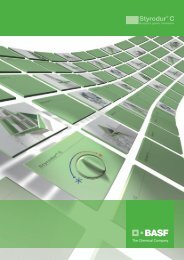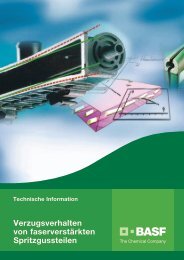Drucken plastics 01_04 _E_dp - BASF Plastics Portal
Drucken plastics 01_04 _E_dp - BASF Plastics Portal
Drucken plastics 01_04 _E_dp - BASF Plastics Portal
Create successful ePaper yourself
Turn your PDF publications into a flip-book with our unique Google optimized e-Paper software.
Markets and Products 18<br />
Ecoflex ® for the bag from the fertile fields<br />
The use of biodegradable materials has increased greatly throughout the world, but<br />
in Germany, overregulation prevents their widespread introduction onto the market.<br />
Europe is a union now. Not only<br />
politically but also, to an increasing<br />
extent, in terms of the consumption<br />
behavior of the population. Bioproducts,<br />
for instance, are becoming more<br />
and more popular, particularly among consumers<br />
in the Netherlands, Great Britain<br />
and France, now that their bioproducts<br />
come in biodegradable and compostable<br />
packaging. The building blocks of such<br />
packaging are resource-saving and CO2 neutral renewable raw materials stemming<br />
from agriculture. This packaging acquires<br />
its functionality from the combination of<br />
renewable raw materials with biodegradable<br />
substances on the basis of synthetic<br />
raw materials such as <strong>BASF</strong>’s Ecoflex ® . “A<br />
biodegradable composite made of starch<br />
or polylactic acid obtained from corn or<br />
potatoes together with Ecoflex ® greatly<br />
improves films and packaging so that their<br />
enhanced functionality will make them suitable<br />
for more applications,” explains Dirk<br />
Stärke, product manager for Ecoflex ® at<br />
<strong>BASF</strong>.<br />
Successful<br />
pilot project<br />
However, what is a reality in many European<br />
countries is still a far-off dream for<br />
German consumers. In Germany, excessive<br />
legislation on packaging, biowaste<br />
and fertilizers regulates the use and reutilization<br />
of compostable packaging, with<br />
the result that<br />
nothing gets<br />
done in this<br />
labyrinth of regulations.<br />
Even<br />
the successful<br />
implementation<br />
of a model project<br />
in the city of<br />
Kassel did not do a bit of good. In this the packaging regulations with the objec-<br />
experiment, the organizers, funded by tive of increasing the sales and, thus, the<br />
government subsidies, studied the use of use of renewable raw materials.<br />
biopackaging in actual practice, thereby In order to facilitate the market introduction<br />
confirming that this packaging can be col- while at the same time improving the funclected<br />
and utilized without any problem. tionality of biodegradable materials, the<br />
Consumers responded particularly posi- German Farmer’s Association and the Gertively<br />
to biodegradable packaging. And man Association of the Chemical Industry<br />
now, it seems that the path might be clear are objecting to the statutory stipulations<br />
for bio<strong>plastics</strong> in Germany as well.<br />
pertaining to the raw material base of<br />
“Bio<strong>plastics</strong> made of corn, potatoes or cel- biodegradable materials. For instance, with<br />
lulose are on the threshold of a very prom- their requirement that biodegradable packising<br />
future,” explains Matthias Berninger, aging materials have to “consist primarily<br />
state secretary at the German Ministry for of renewable raw materials”, these regula-<br />
Consumer Affairs, at the same time revealtions run counter to the objective of proing<br />
that a major hurdle to their widespread moting the market introduction of renew-<br />
introduction could soon be eliminated.<br />
“The German government supports the<br />
able raw materials.<br />
approach of exempting bio<strong>plastics</strong> from Approval of Ecoflex<br />
the Green Dot in the future,” elaborates<br />
Berninger. Manufacturers of biodegradable<br />
<strong>plastics</strong> have now found a prominent<br />
advocate in the German Farmer’s Association.<br />
In a statement issued jointly with the<br />
German Association of the Chemical<br />
Industry, farmers are calling for a change in<br />
® Ecoflex<br />
for food<br />
products in the United States<br />
The parties involved are confident that,<br />
over the long run, the costs for biopackaging<br />
will also drop as these materials enjoy<br />
more widespread use. For instance, the<br />
raw material costs for renewable raw<br />
® is certified in the United States …,


